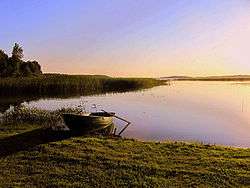ezers
Latvian

Sīvera ezers (Latvijā)
Etymology
From Proto-Balto-Slavic *eźera- (“lake”), from Proto-Indo-European *eǵʰerom (“lake”), from the stem *eǵʰ- (“border”) (whence also Latvian eža, q.v.). The meaning change, from “border” to “lake,” is probably motivated by the fact that lakes were often used as markers of the border between separate regions. Cognates include Lithuanian ẽžeras, Old Prussian assaran ([azaran]), Sudovian ziro (< *eziro < *ezero), Proto-Slavic *ezero (Old Church Slavonic ѥзєро (jezero), Russian, Ukrainian о́зеро (ózero), Belarusian во́зера (vózjera), Bulgarian ѐзеро (ѐzero), Czech jezero, Polish jezioro.[1]
Noun
ezers m (1st declension)
- lake (large natural body of freshwater surrounded by land)
- Sīvera ezers ― lake Sīvers
- jūras piekrastes ezers ― coastal lake
- ieapaļš, izstiepts ezers ― roundish, stretched lake
- šaurs, dziļš ezers ― narrow, deep lake
- rāms ezers ― serene lake
- peldēties, zvejot ezerā ― to swim, to fish in a lake
- ezeru nogulumi ― lake sediments
- ezeriem bagāts apvidus ― a region rich in lakes
- te tumšāks, te gaišāks, te noslēpumaini spulgodams, te kūpēdams miglā, ceļa malā dus ezers ― by the road side there lay a lake, here darker, there lighter, here mysteriously reflective, there clouded in fog
Declension
Declension of ezers (1st declension)
References
- Karulis, Konstantīns (1992), “ezers”, in Latviešu Etimoloģijas Vārdnīca (in Latvian), Rīga: AVOTS, →ISBN
This article is issued from
Wiktionary.
The text is licensed under Creative
Commons - Attribution - Sharealike.
Additional terms may apply for the media files.